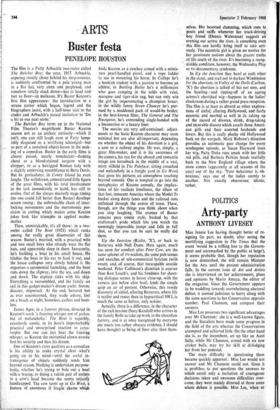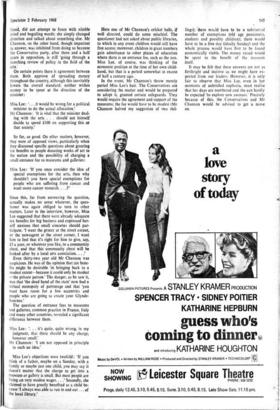Arty-party
POLITICS ANTHONY LIVESEY
Miss Jennie Lee having thought better of re- signing (in part, no doubt, after seeing the mortifying suggestion in The Times that the event 'would be a trifling loss to the Govern- ment and unremarked by the public at large), it seems probable that, though her reputation is now diminished, she will remain Minister for the Arts until the present administration falls. In the current issue of Art and Artists she is interviewed on her achievements, plans and opinions by Mario Amaya, the editor of the magazine. Since the Government appears to be waddling towards overwhelming electoral defeat, it seemed judicious to hurry along with the same questions to her Conservative opposite number, Paul Channon, and compare their answers.
Miss Lee possesses two significant advantages over Mr Channon: she is a well-known figure, and the Socialists have made some progress in the field of the arts whereas the Conservatives attempted and achieved little. On the other hand she is, as the incumbent, set up like an Aunt Sally, while Mr Channon, armed with six new cricket balls, may try his skill at dislodging her from her pedestaL The main difficulty in questioning them became quickly apparent : Miss Lee would not answer and Mr Channon could not. Since it is profitless to put questions the answers to which entail only a recitation of courageous decisions taken and awesome difficulties over- come, they were mainly directed at those areas where debate is possible. Miss Lee, when sO faced, did not attempt to fence with nimble mind and beguiling words; she simply changed direction and talked about something else. Mr Channon, on the other hand, though impatient to answer, was inhibited from doing so because the Conservative party, after three and a half years in opposition, is still 'going through a searching review of policy in the field of the arts."
On certain points there is agreement between them. Both approve of spreading money throughout the country, although this inevitably lowers the overall standard; neither wishes money to be spent at the direction of the minister: Miss Lee: '... it would be wrong for a political minister to do the actual allocation.'
Mr Channon : It is vital that the minister deal- ing with the arts . . . should not himself decide to spend £100 on supporting this or that society.'
So far, so good. On other matters, however, they were of opposed views, particularly when they discussed specific questions about granting tax benefits to people donating works of art to the nation and the possibility of charging a small entrance fee to museums and galleries:
Miss Lee: 'If you once consider the idea of special exemptions for the arts, then why shouldn't you have special exemptions for people who are suffering from cancer and want more cancer research. . ..?'
Since this, far from answering the question, actually makes no sense whatever, the ques- tioner was again obliged to turn to other matters. Later in the interview, however, Miss Lee suggested that there were already adequate tax benefits for big business and expressed her- self anxious that small concerns should par- ticipate. 'I want the grocer at the street corner, or the newsagent at the street corner, I want him to feel that it's right for him to give, say, £5 a year, or whatever you like, to a community chest, and that this community chest will be looked after by a local arts association. ..
Even thirty-two year old Mr Channon was suspicious. He was of the opinion that tax bene- fits might be desirable 'in bringing back to a modest extent—because it could only be modest —the private patron.' The danger, as he saw it, was that 'the dead hand of the state' now had a virtual monopoly of patronage and that 'you must have room for a few eccentrics and people who are going to create your Glynde- bournes.'
The question of entrance fees to museums and galleries, common practice in France, Italy and many other countries, revealed a significant difference between them.
Miss Lee: '. . . it's quite, quite wrong, in my judgment, that there should be any charge, however small.'
Mr Channon: 'I am not opposed in principle to such an idea.'
Miss Lee's objections were twofold: 'If you think of a father, maybe on a Sunday, with a family or maybe just one child, you may say it doesn't matter that the charge to get into a museum or gallery is small. But most people are living on very modest wages. ...' Secondly, she claimed to have greatly benefited as a child be- cause 'I always was able to run in and out. . . of the local library.' Here one of Mr Channon's cricket balls, if well directed, could do some mischief. The questioner had not asked about public libraries, to which in any event children would still have free access; moreover, children in great numbers gain admittance to other places of education where there is an entrance fee, such as the zoo. Miss Lee, of course, was thinking of the economic position at the time of her own child- hood, but that is a period somewhat in excess of half a century ago.
In the event, Mr Channon's throw merely parted Miss Lee's hair. The Conservatives are considering the matter and would be prepared to adopt it, granted certain safeguards. They would require the agreement and support of the museums; the fee would have to be modest (Mr Channon halved my suggestion of two shil- lings); there woLld have to be a substantial number of exemptions (old age pensioners, students and possibly children); there would have to be a free day (ideally Sunday) and the whole process would have first to be found economically viable. The money raised would be spent to the benefit of the museum itself.
It may be felt that these answers are not as forthright and incisive as we might have ex- pected from our leaders. However, it is only fair to observe that Miss Lee, even in her moments of unbridled euphoria, must realise that her days are numbered and she can hardly be expected 'to explore new avenues.' Precisely because of this, the Conservatives and Mr Channon would be advised to get a move
OD.



































 Previous page
Previous page